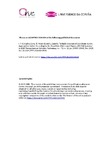A Rank-Constrained Coordinate Ascent Approach to Hybrid Precoding for the Downlink of Wideband Massive (MIMO) Systems

Use este enlace para citar
http://hdl.handle.net/2183/34563Coleccións
- Investigación (FIC) [1678]
Metadatos
Mostrar o rexistro completo do ítemTítulo
A Rank-Constrained Coordinate Ascent Approach to Hybrid Precoding for the Downlink of Wideband Massive (MIMO) SystemsData
2023-12Cita bibliográfica
J. P. González-Coma, Ó. Fresnedo and L. Castedo, "A Rank-Constrained Coordinate Ascent Approach to Hybrid Precoding for the Downlink of Wideband Massive (MIMO) Systems," in IEEE Transactions on Vehicular Technology, vol. 72, no. 12, pp. 15953-15966, Dec. 2023, doi: 10.1109/TVT.2023.3293933.
É version de
https://doi.org/10.1109/TVT.2023.3293933
Resumo
[Abstract]: An innovative approach to hybrid analog-digital precoding for the downlink of wideband massive MIMO systems is developed. The proposed solution, termed Rank-Constrained Coordinate Ascent (RCCA), starts seeking the full-digital precoder that maximizes the achievable sum-rate over all the frequency subcarriers while constraining the rank of the overall transmit covariance matrix. The frequency-flat constraint on the analog part of the hybrid precoder and the non-convex nature of the rank constraint are circumvented by transforming the original problem into a more suitable one, where a convenient structure for the transmit covariance matrix is imposed. Such structure makes the resulting full-digital precoder particularly adequate for its posterior analog-digital factorization. An additional problem formulation to determine an appropriate power allocation policy according to the rank constraint is also provided. The numerical results show that the proposed method outperforms baseline solutions even for practical scenarios with high spatial diversity.
Palabras chave
Massive MIMO
Hybrid precoding
Wideband
Rank constraints
Hybrid precoding
Wideband
Rank constraints
Descrición
© 2023 IEEE. This version of the article has been accepted for publication, after peer review. Personal use of this material is permitted. Permission from IEEE must be obtained for all other uses, in any current or future media, including reprinting/republishing this material for advertising or promotional purposes, creating new collective works, for resale or redistribution to servers or lists, or reuse of any copyrighted component of this work in other works. The Version of Record is available online at: https://doi.org/10.1109/TVT.2023.3293933.
Versión do editor
Dereitos
© 2023 IEEE. All rights reserved. Todos os dereitos reservados.
ISSN
0018-9545





